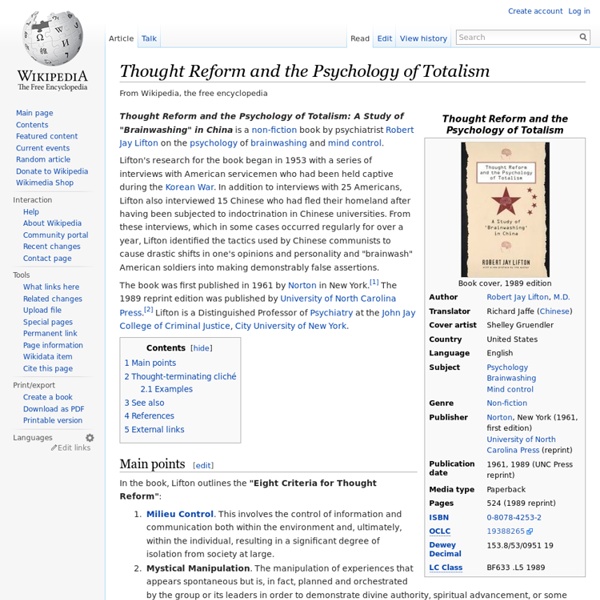Thought Reform and the Psychology of Totalism

What is Swaraj?
What Is Swaraj? The concept of swaraj, or self-rule, was developed during the Indian freedom struggle. In his book Hind Swaraj (1909), Gandhi sought to clarify that the meaning behind swaraj was much more than simply "wanting [systems of] English rule without the Englishman; the tiger's nature but not the tiger." On another level, the call for swaraj represents a genuine attempt to regain control of the 'self' - our self-respect, self-responsibility, and capacities for self-realization - from institutions of dehumanization. Gandhi wanted all those who believed in swaraj: (1) to reject and wholly uproot the British raj (rule) from within themselves and their communities; and, (2) to regenerate new reference points, systems, and structures that enable individual and collective self-development. How is this relevant for us today?
Think of the children
"Think of the children" (also "What about the children?") is a phrase that evolved into a rhetorical tactic.[1][2][3] Used literally it to refers to children's rights, as in discussions of child labor.[4][5][6] In debate, this plea for pity is wielded as an appeal to emotion which can constitute a logical fallacy.[1][2][3] Art, Argument, and Advocacy (2002) argued the exhortation may supplant emotion for reason in debate.[1] Ethicist Jack Marshall wrote in 2005 that the phrase's popularity stemmed from its capacity to stunt rationality, particularly discourse on morals.[2] "Think of the children" was invoked by censorship proponents to shield children from perceived dangers.[7][8] Community, Space and Online Censorship (2009) noted that classifying children in an infantile way as innocents in need of protection was a form of obsession over the concept of purity.[7] A 2011 article in the Journal for Cultural Research observed the term grew out of a moral panic.[9] Background[edit]
Unlearning and The Stockholm Effect
The stories I’ve read have all given me much food for thought, so much so that I couldn’t possibly say it all in a few pages. The most striking thing about these seven stories, to me, is that these writers all did well in school, come from middle-class families, and yet discovered (or "unlearned"), on their own, that school has limited rather than expanded their learning abilities. Why, I wonder, aren’t more people questioning school as these writers have? Once one reaches compulsory school age in any country, the process of schooling is identical: our natural urge to learn and explore is controlled and measured on a daily basis, and universal compulsory school attendance laws make it hard for alternatives to school to emerge. I think most of us identify with our caretakers in school and make the best of the situation. In August, 1973, two ex-convicts held three women and a man hostage during a robbery in Stockholm, Sweden. What can better describe the conventional school curriculum?
Safron Afghanistan
Related:
Related:



